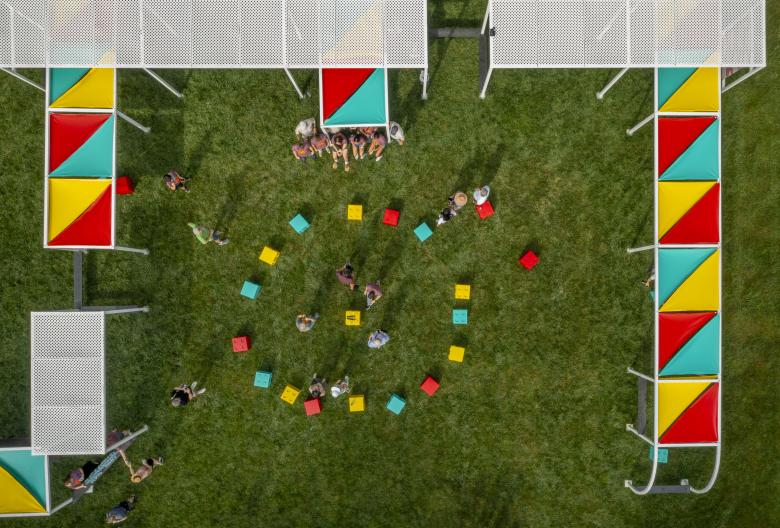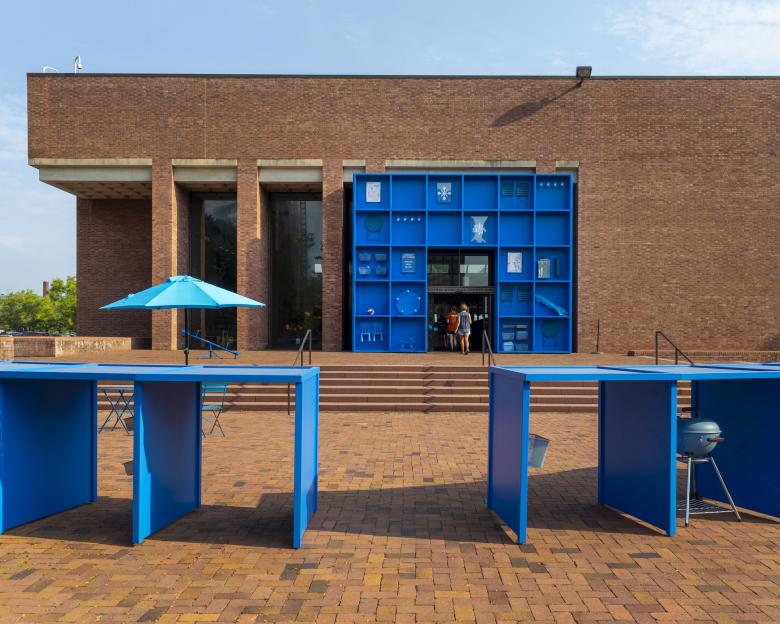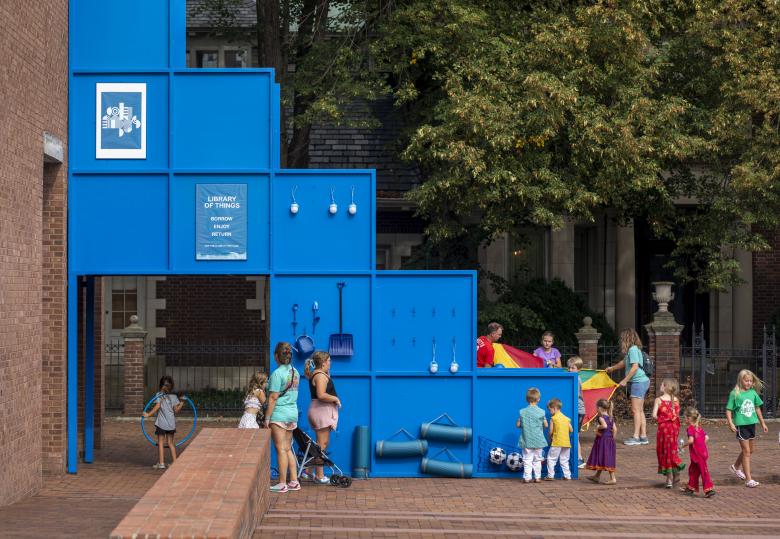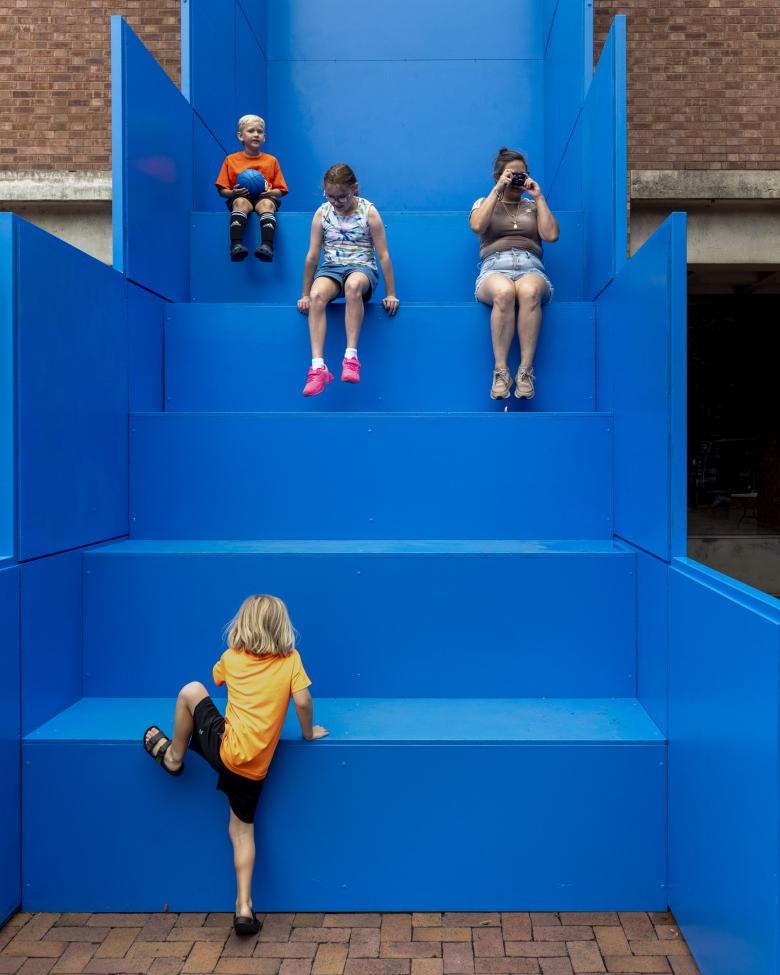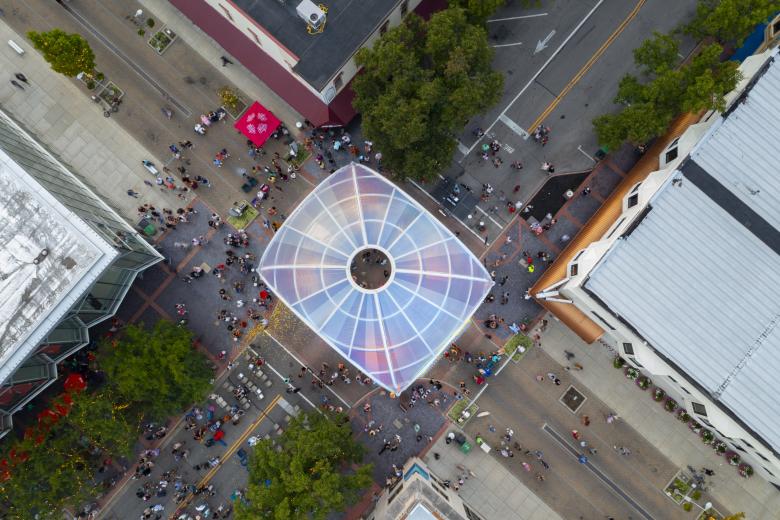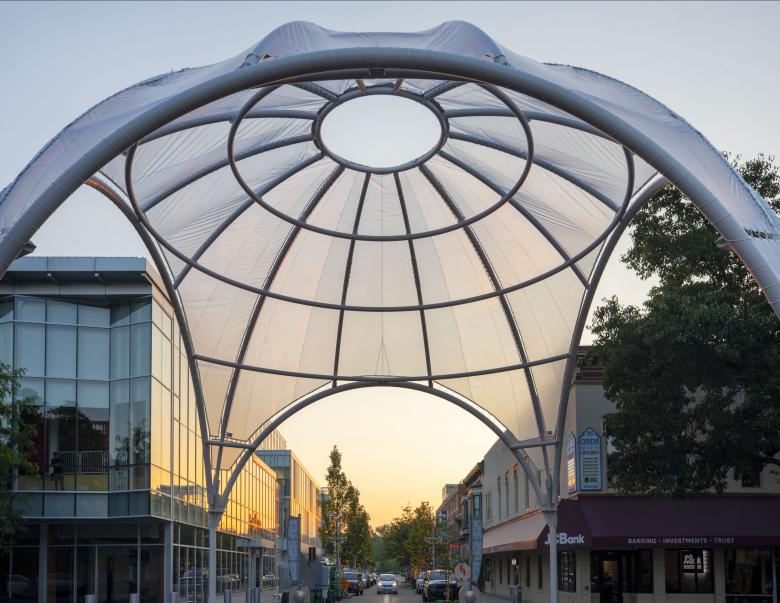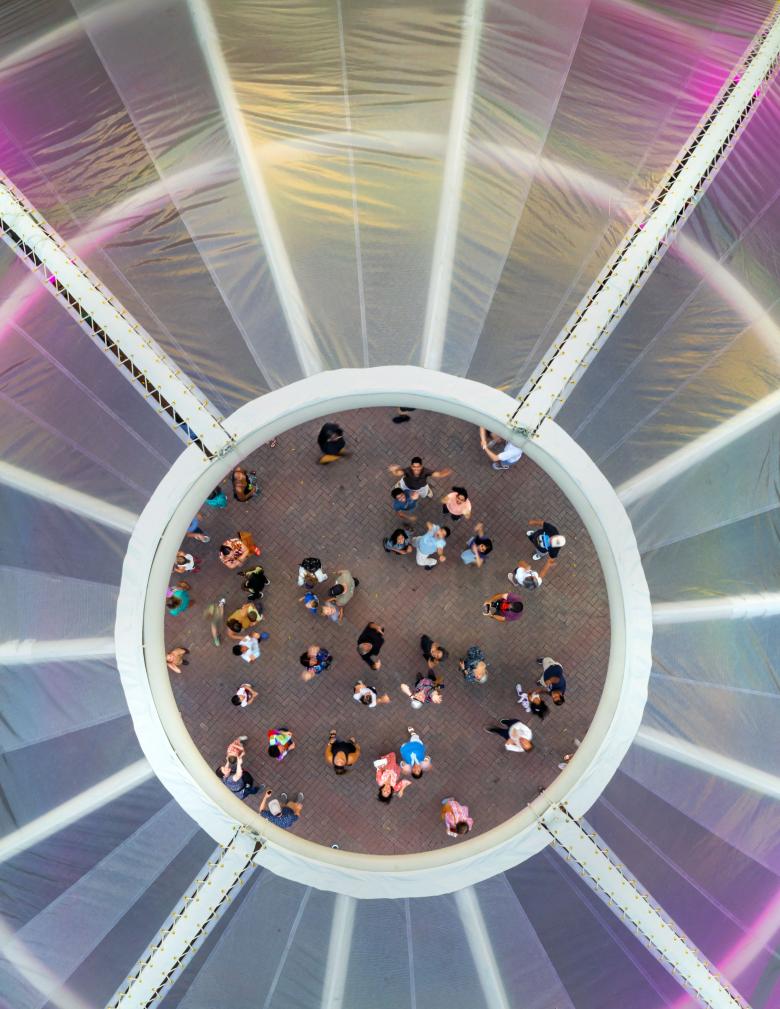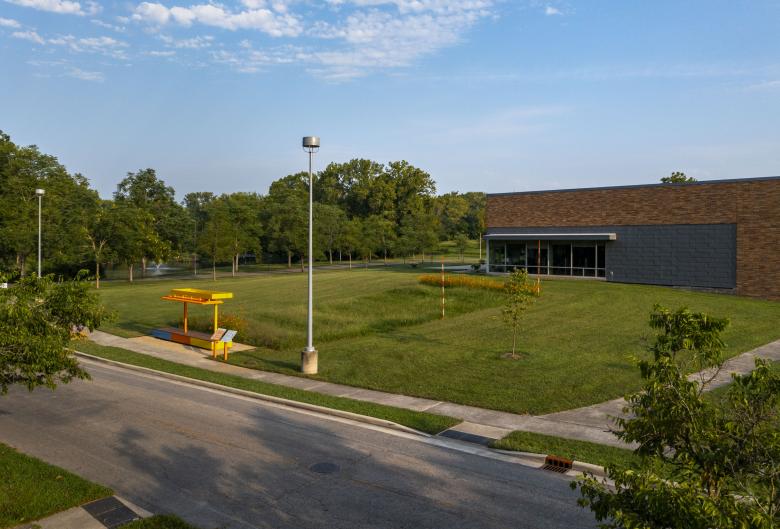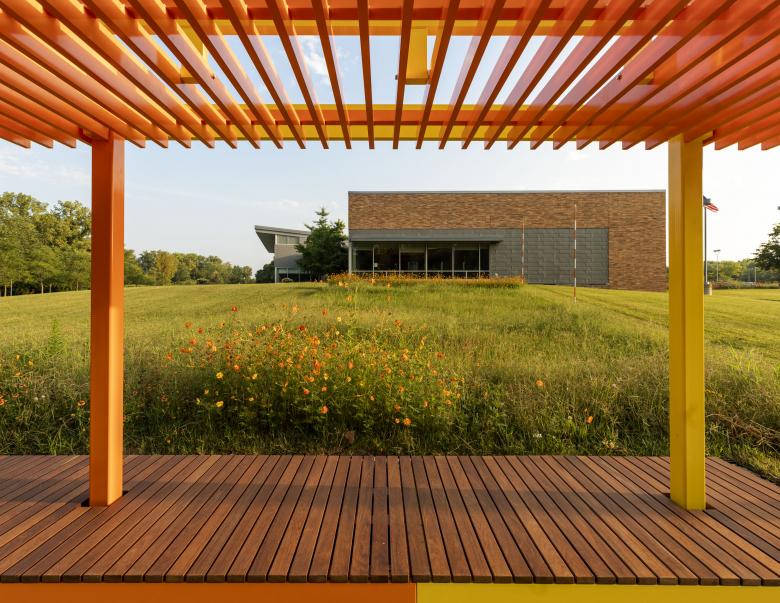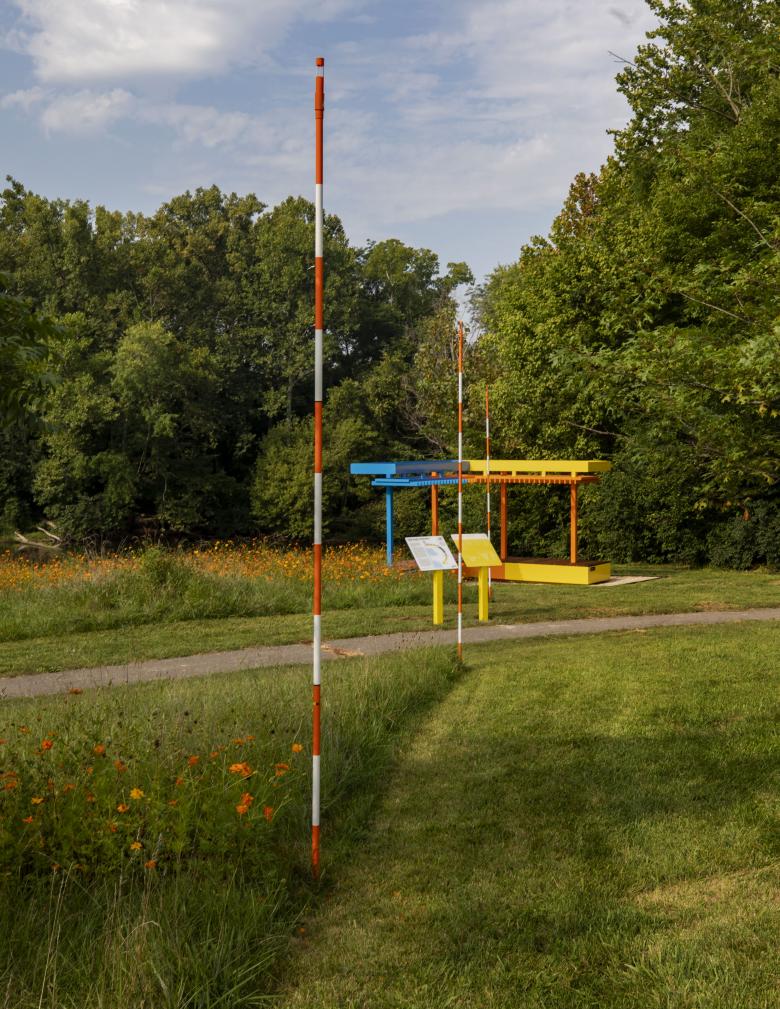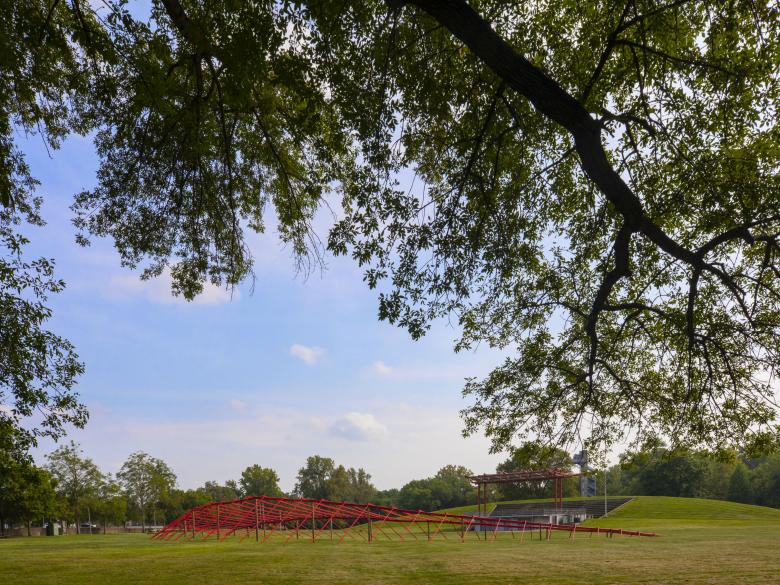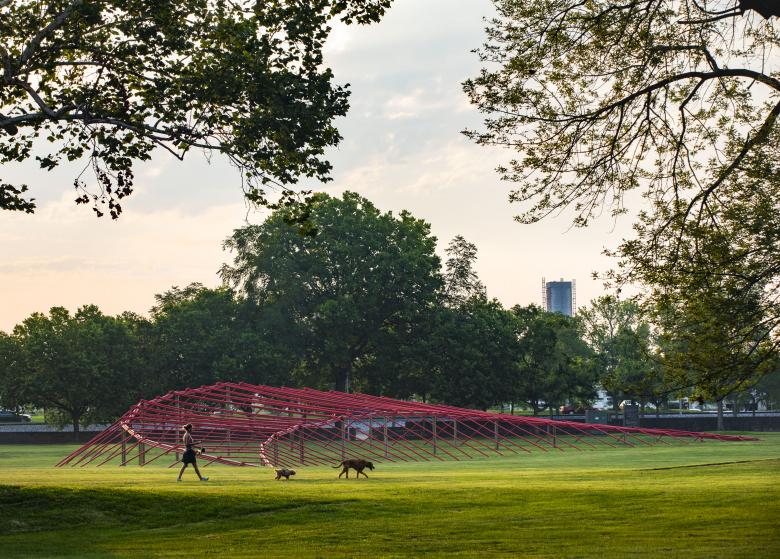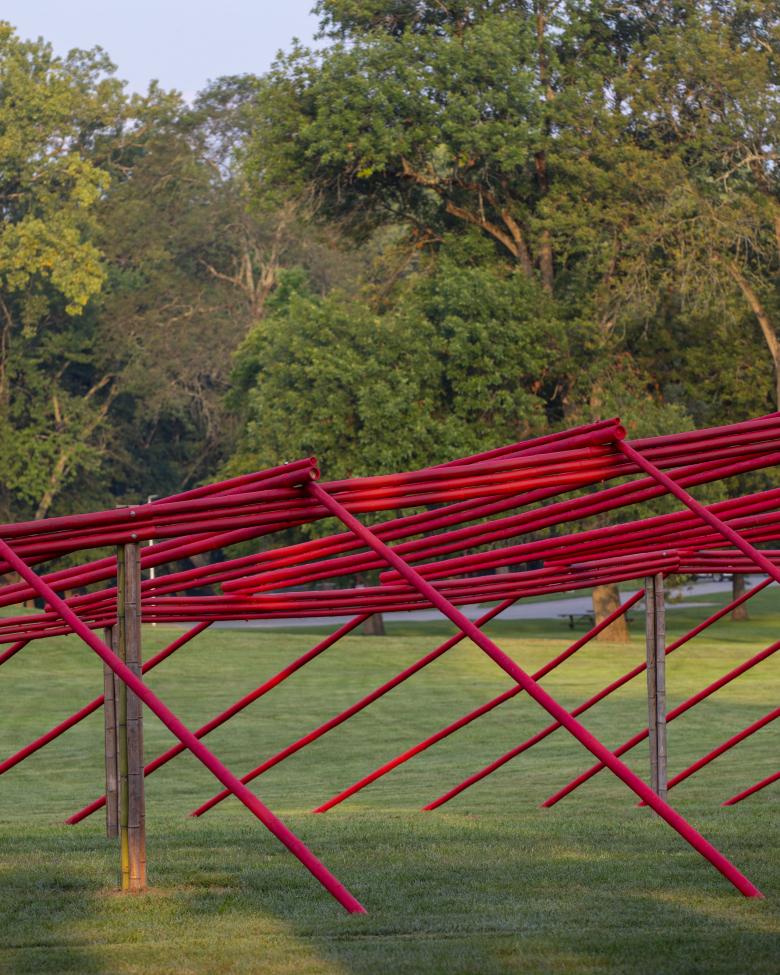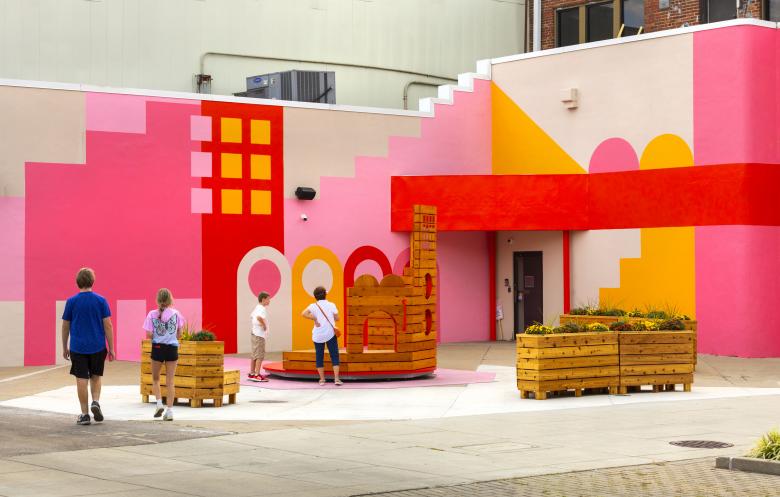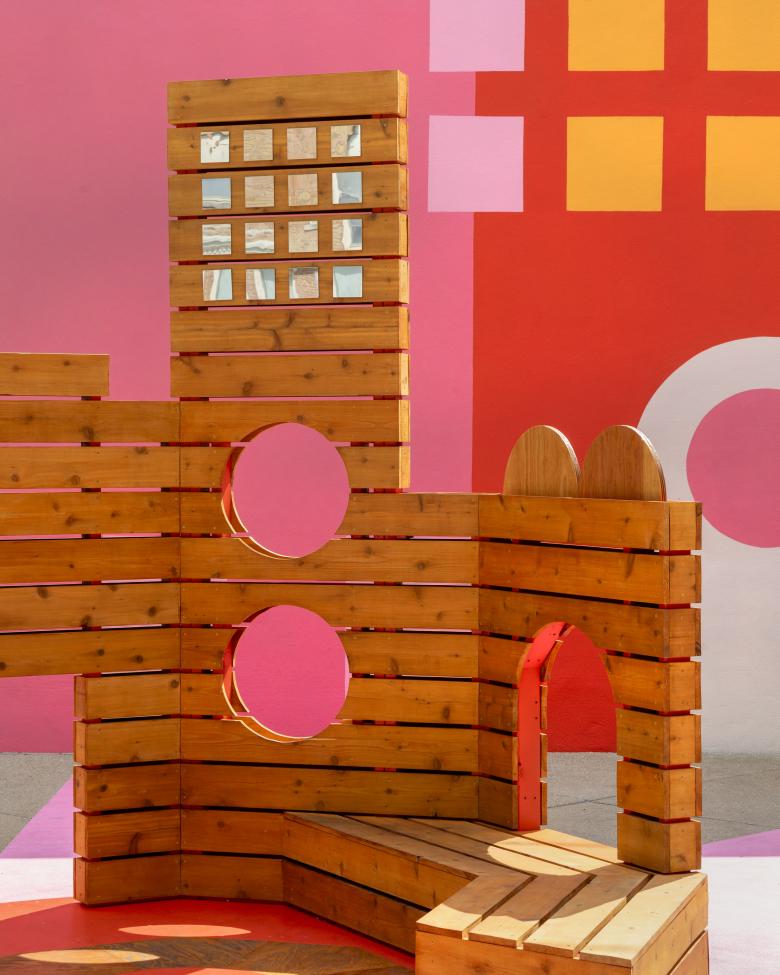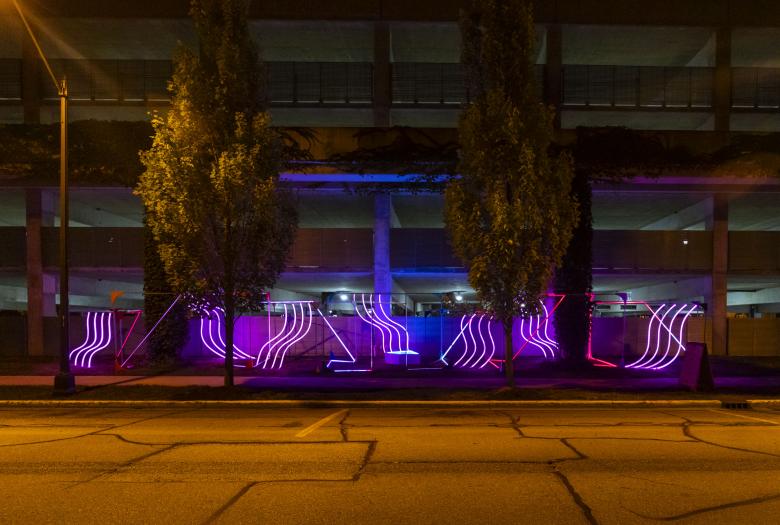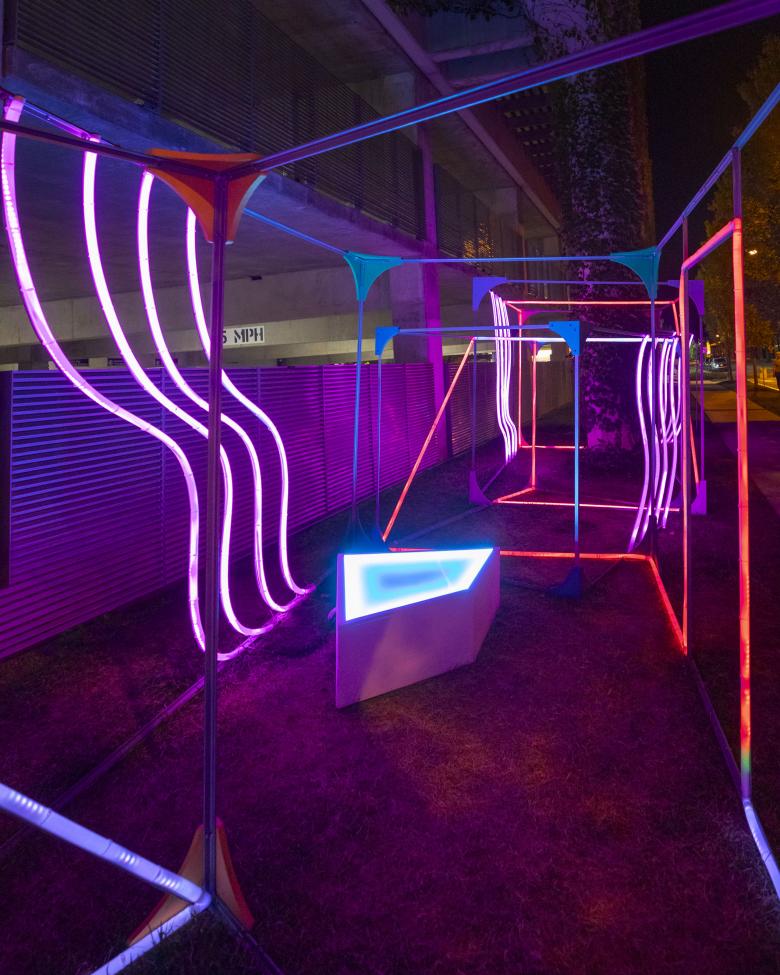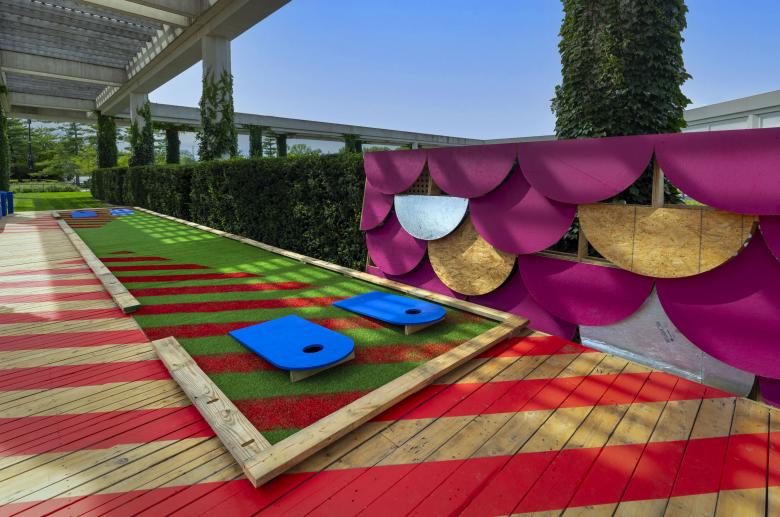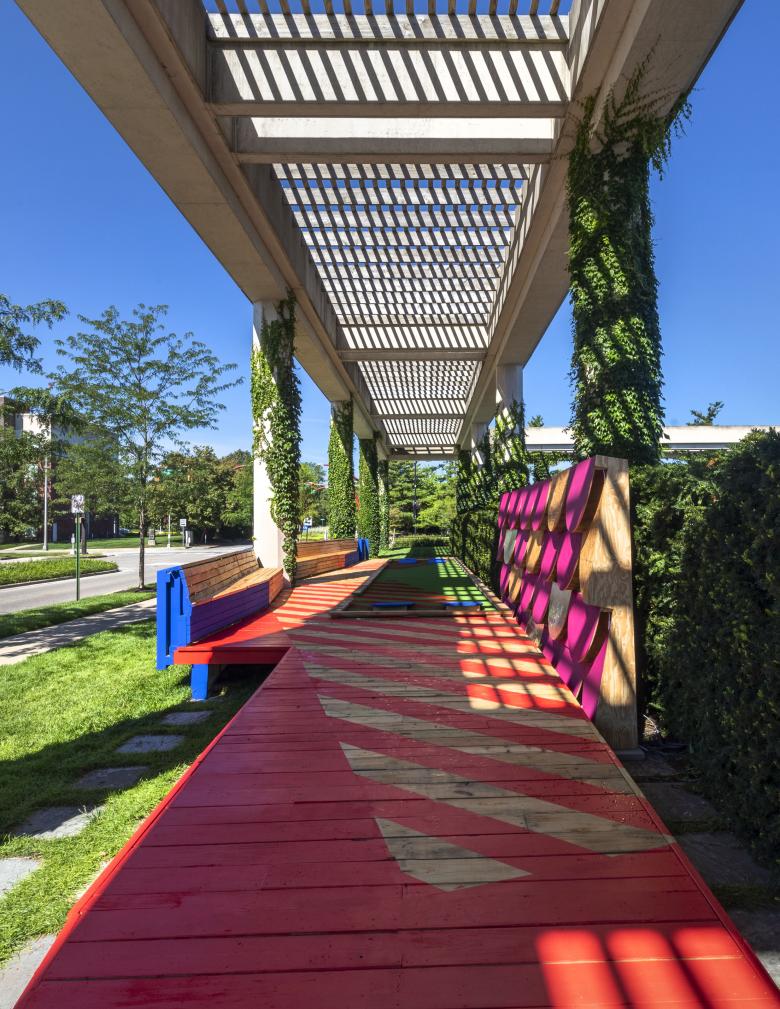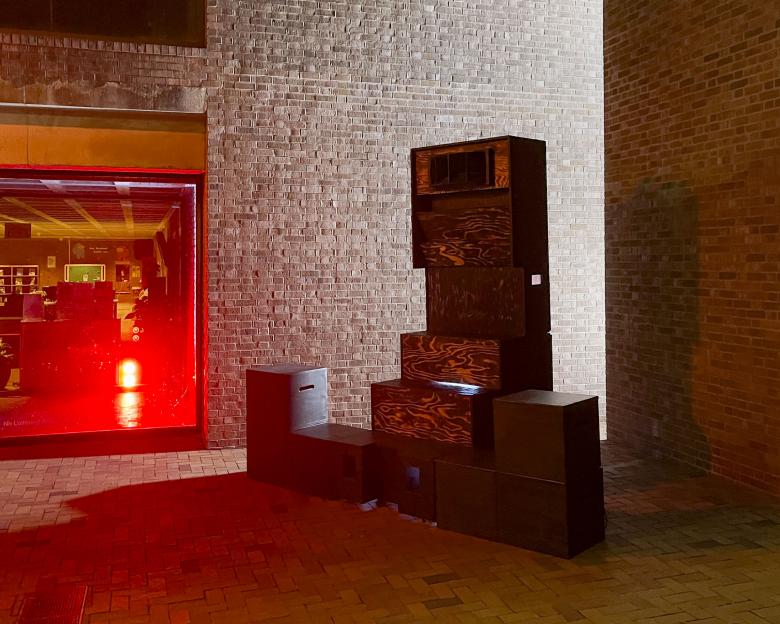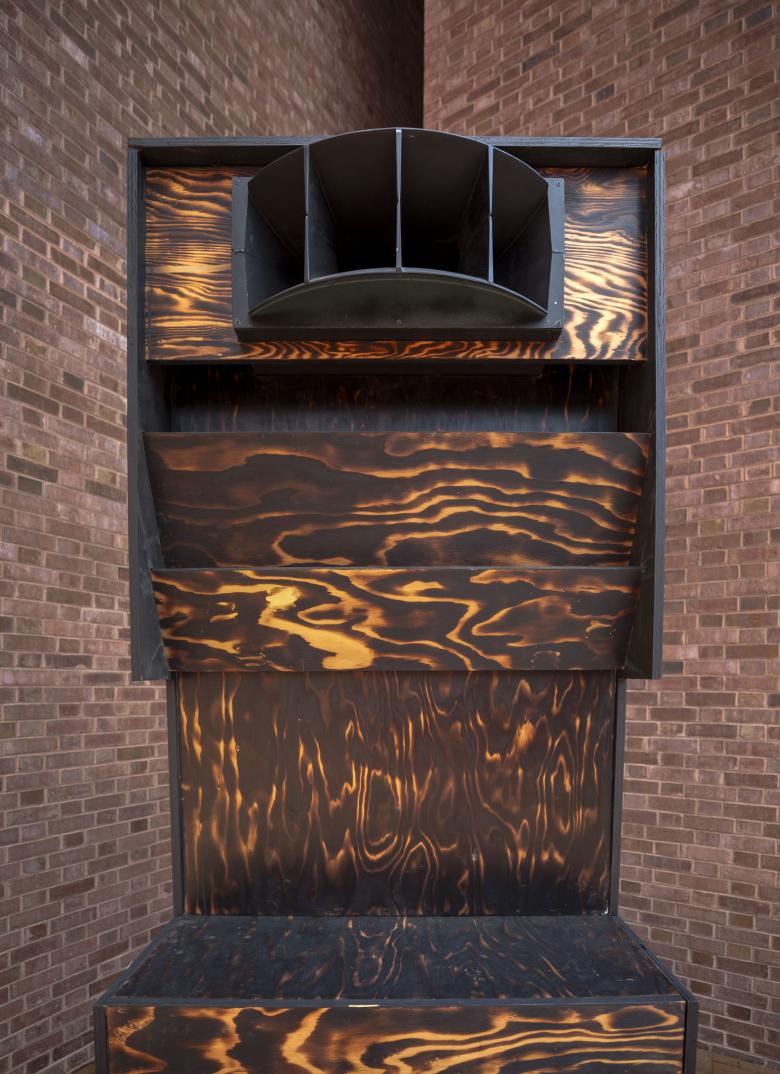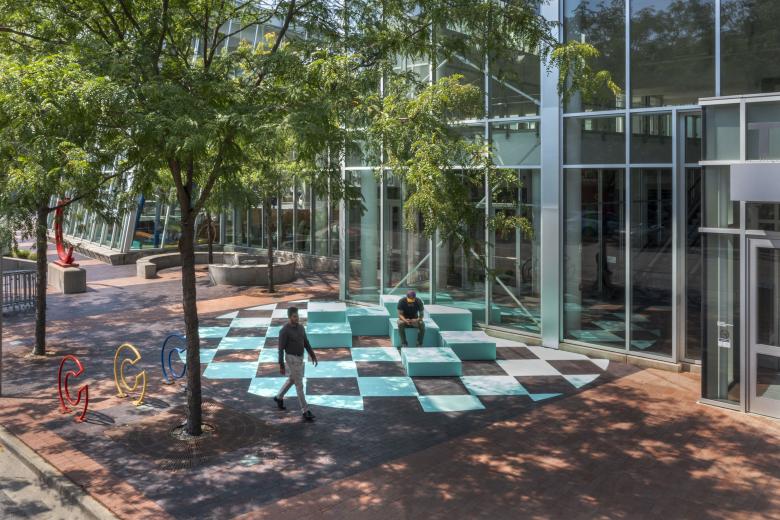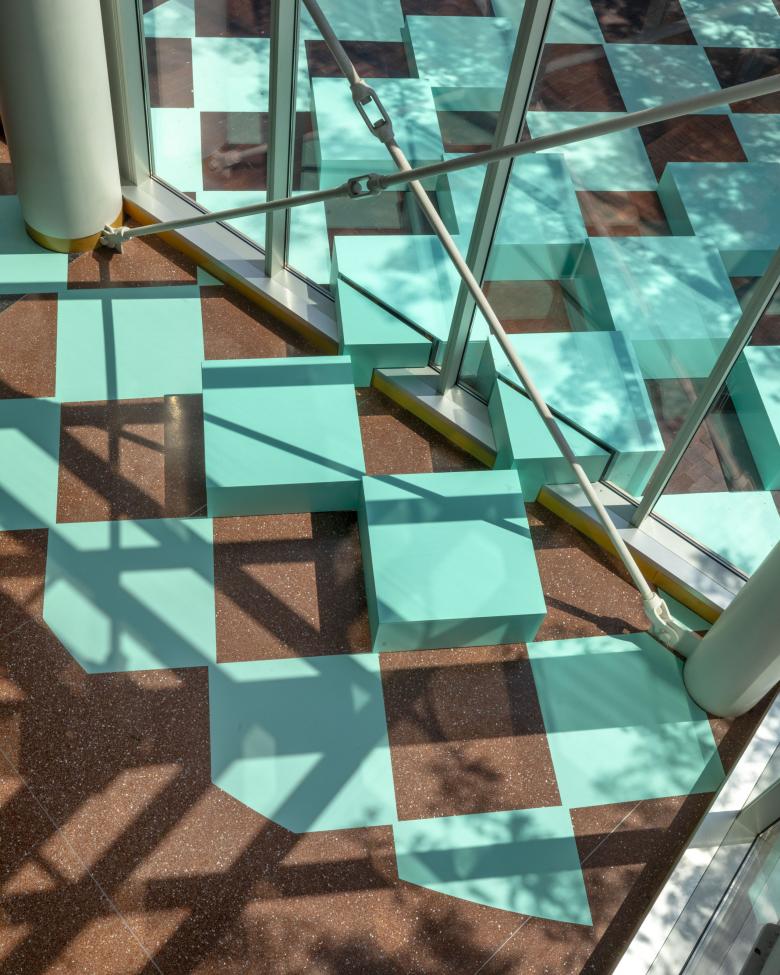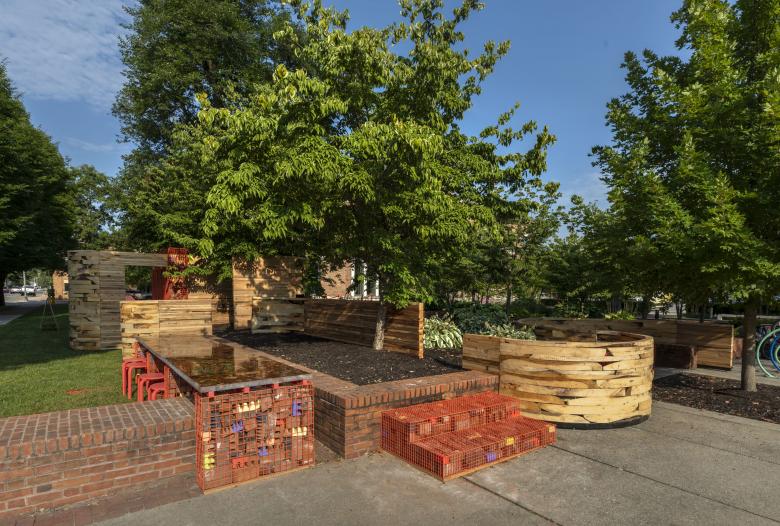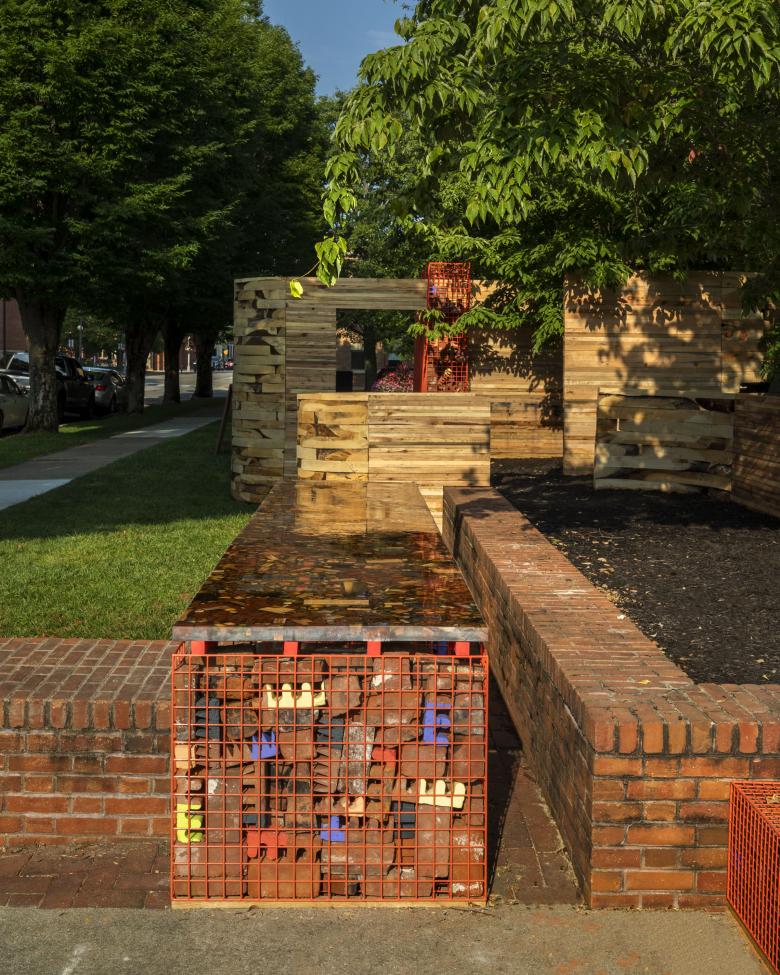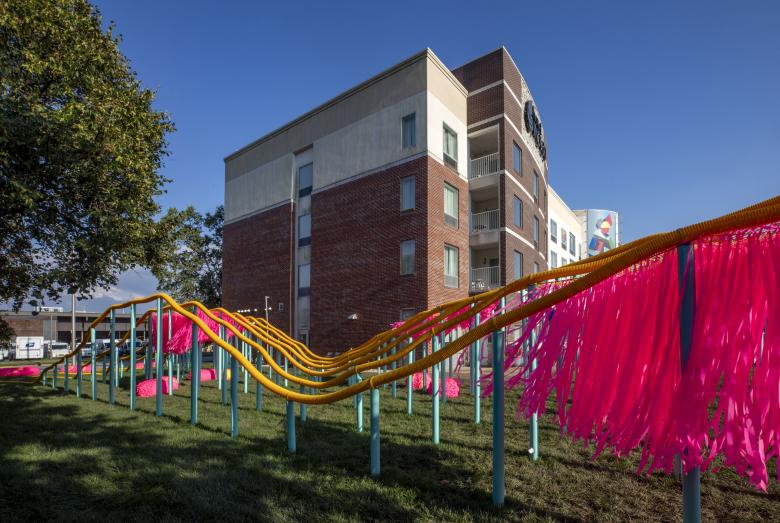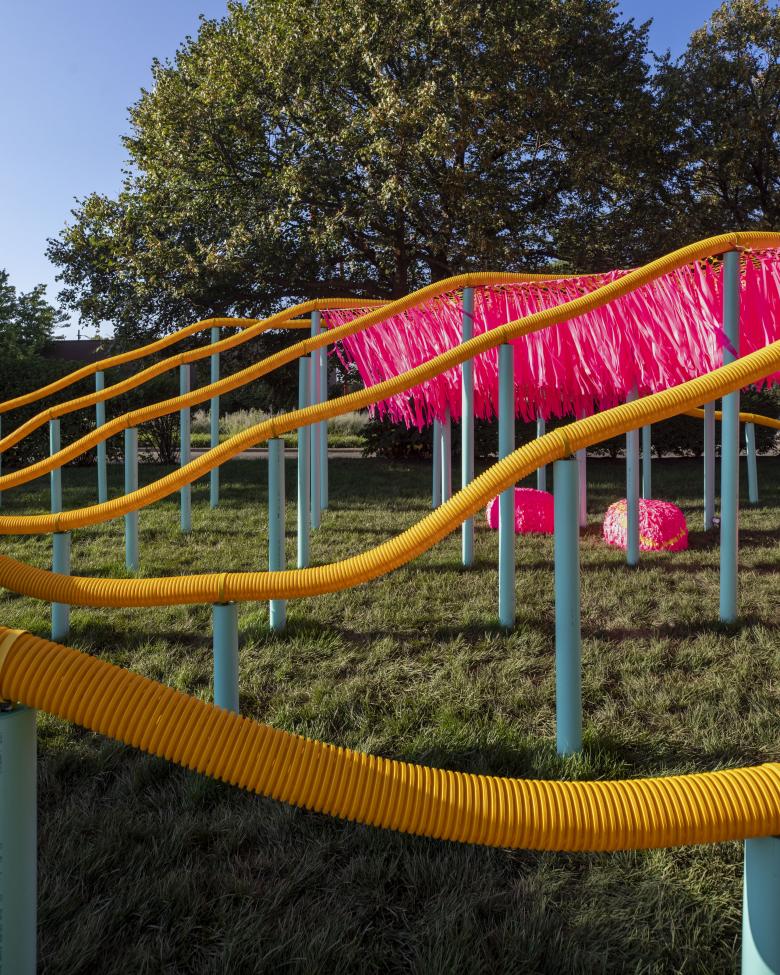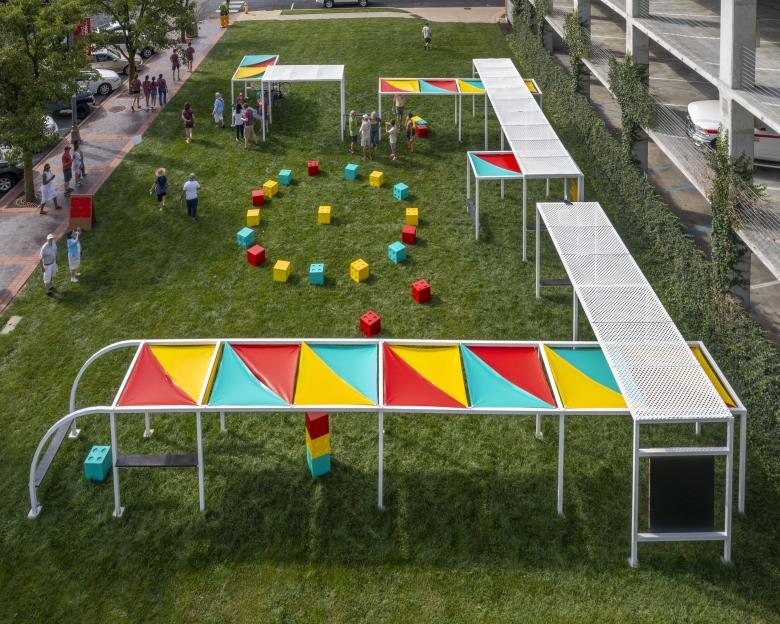8. septiembre 2023
High School Design Team installation (Photo: Hadley Fruits)
The fourth iteration of the biennial Exhibit Columbus opened to the public on August 26, 2023, with a dozen installations spread across Columbus, Indiana, the small town that is famous as a Midwestern mecca of modern architecture. The three-month-long exhibition was shaped by a large curatorial team under the theme Public by Design.
Established in 2016 by the Landmark Columbus Foundation, Exhibit Columbus consists of a two-year cycle of events that starts with a symposium, moves on to design presentations, and culminates in the opening of the exhibition with site-responsive installations. Columbus is unique for its density of modern architecture in a town that counts just over 50,000 residents, with 20th-century buildings by the Saarinens and Robert Venturi, to name just two, found alongside recent buildings by Deborah Berke, William Rawn, and others. No wonder that since its inception the exhibition has focused, not on gallery exhibitions, but on installations placed throughout the city and near some of its notable buildings. As in previous iterations, there are three types of installations within the exhibition:
- J. Irwin and Xenia S. Miller Prize (4 installations; named for the husband-and-wife patrons that made Columbus a hub of modern architecture)
- University Design Research Fellowship (7 installations, picked from a competition in which more than 50 university professors applied)
- High School Design Team (students from the C4 Columbus Area Career Connection designed and built their installation)
So, what does “public by design” mean? According to the six-person curatorial team: “Public by Design creates meaningful connections between people and the public spaces they share. The theme of the fourth cycle of Exhibit Columbus builds on the legacy of Columbus, Indiana to explore how collaborations between communities and designers can revitalize and reimagine historic downtowns as equitable, beautiful, and joyful places. Public by Design serves as a platform for many vibrant communities to become connected around the values of inclusivity, care, and generosity. This cycle celebrates creative methods of collaboration that communities and designers can use to grow a sense of belonging and connection in public spaces.”
Below is a visual tour through the dozen installations that comprise this year's Exhibit Columbus exhibition, with excerpts from the project statements and links to the installations on the Exhibit Columbus website. Public by Design is on display until November 26, 2023. Additionally, a series of four “Miller Prize Conversaions” are being held in Columbus between September 19 and November 10.
2023 J. Irwin and Xenia S. Miller Prize Recipients
Miller Prize: “Designed by the public” by Tatiana Bilbao ESTUDIO (Photo: Hadley Fruits)
Designed by the public by Tatiana Bilbao ESTUDIO
Site: Plaza of Cleo Rogers Memorial Library (I.M. Pei, 1971)
Miller Prize: “Designed by the public” by Tatiana Bilbao ESTUDIO (Photo: Hadley Fruits)
Statement (excerpt): “Designed by the public encourages visitors to freely use a broad collection of objects, furniture, and equipment to build their own ideas, to allow for all possibilities, and to embrace the unexpected. It literally provides the tools for people to express their desires and intentions, opening up an ongoing participatory process of exchange.”
Miller Prize: “Designed by the public” by Tatiana Bilbao ESTUDIO (Photo: Hadley Fruits)
Miller Prize: “InterOculus” by Practice for Architecture and Urbanism | PAU (Photo: Hadley Fruits)
InterOculus by Practice for Architecture and Urbanism | PAU
Site: At the intersection of Washington and Fourth Streets, near The Commons (Koetter Kim, 2011)
Miller Prize: “InterOculus” by Practice for Architecture and Urbanism | PAU (Photo: Hadley Fruits)
Statement (excerpt): “Inspired by influences as diverse as the iconic Pantheon in Rome, local carnival vernacular, ice cream sundaes from Zaharakos, and the wigwams of the Miami and Shawnee peoples, the design creates a visual and physical destination that can help revitalize downtown day and night through the experiences of suspension, illumination, and projection.”
Miller Prize: “InterOculus” by Practice for Architecture and Urbanism | PAU (Photo: Hadley Fruits)
Miller Prize: “THE PLOT PROJECT” by PORT (Photo: Hadley Fruits)
Site: Mill Race Center (William Rawn Associates, 2011)
Miller Prize: “THE PLOT PROJECT” by PORT (Photo: Hadley Fruits)
Statement (excerpt): “THE PLOT PROJECT interfaces with the Mill Race Center and its surrounding landscapes to place the Center’s diverse activities and the biodiversity of the park into public dialogue. […] [C]onservation outreach stations are positioned as new places to reflect that invite social interaction and education. The color of the stations riff on the mid-century formal architectural heritage and color palette of Columbus.”
Miller Prize: “THE PLOT PROJECT” by PORT (Photo: Hadley Fruits)
Miller Prize: “Echoes of the Hill” by Studio Zewde (Photo: Hadley Fruits)
Echoes of the Hill by Studio Zewde
Site: Mill Race Park (Michael Van Valkenburgh and Stanley Saitowitz, 1992)
Miller Prize: “Echoes of the Hill” by Studio Zewde (Photo: Hadley Fruits)
Statement (excerpt): “In the dedication ceremony 30 years ago, the designer of this park, Michael Van Valkenburgh, made explicit reference to the hill’s form echoing the ancient mound-building traditions from the Missippean culture. This installation echoes this hill with red frames and makes the mound’s circle complete, suggesting a new public space for gathering.”
Miller Prize: “Echoes of the Hill” by Studio Zewde (Photo: Hadley Fruits)
2023 University Design Research Fellows
University Fellowship: “A Carousel for Columbus” by Joseph Altshuler and Zack Morrison, University of Illinois Urbana-Champaign School of Architecture (Photo: Hadley Fruits)
A Carousel for Columbus by Joseph Altshuler and Zack Morrison
Site: Ovation Plaza (one block east of InterOculus)
Statement (excerpt): “A Carousel for Columbus is a locomotive love letter in-the-round. Shapely silhouettes sampled from the city’s iconic architecture huddle together to form a curious carousel, a backdrop for public life in the city. Supergraphics, also sampled from the city’s architecture, animate the walls and ground surfaces of the plaza.”
University Fellowship: “A Carousel for Columbus” by Joseph Altshuler and Zack Morrison, University of Illinois Urbana-Champaign School of Architecture (Photo: Hadley Fruits)
University Fellowship: “PRISMA” by Esteban Garcia Bravo and Maria Clara Morales, Department of Computer Graphics Technology at Purdue University (Photo: Hadley Fruits)
PRISMA by Esteban Garcia Bravo and Maria Clara Morales
Site: In front of Cummins Parking Garage on Jackson Street
Statement (excerpt): “Inspired by Columbus' modern architectural legacy, a rectangular prism is used as a foundation to create an open-air tunnel with a free-flowing, animated lighted experience. Walking through PRISMA, the entire space comes alive with animated lights, each color vibrantly playing off the next.”
University Fellowship: “PRISMA” by Esteban Garcia Bravo and Maria Clara Morales, Department of Computer Graphics Technology at Purdue University (Photo: Hadley Fruits)
University Fellowship: “Ground Rules” by Jessica Colangelo and Charles Sharpless, University of Arkansas Fay Jones School of Architecture and Design (Photo: Hadley Fruits)
Ground Rules by Jessica Colangelo and Charles Sharpless
Site: Cummins Corporate Office Building (Kevin Roche, 1984)
Statement (excerpt): “Ground Rules floats on an elevated playing court and provides seating under the concrete colonnade of the Cummins Corporate Office Building. The project responds to the monumental building and its location across many streets by inserting an architectural structure within the gridded structure. This installation creates a spontaneous gathering space for office workers and downtown pedestrians alike.”
University Fellowship: “Ground Rules” by Jessica Colangelo and Charles Sharpless, University of Arkansas Fay Jones School of Architecture and Design (Photo: Hadley Fruits)
University Fellowship: “RESPONDER” by Deborah Garcia, Massachusetts Institute of Technology Department of Architecture (Photo: Hadley Fruits)
RESPONDER by Deborah Garcia
Site: Children's entrance aof Cleo Rogers Memorial Library (I.M. Pei, 1971)
Statement (excerpt): “RESPONDER is a sound installation and architectural narrative that focuses on conducting the unique voice of the Cleo Rogers Memorial Library. […] Every evening, programmed to synchronize with sundown, the library will awaken for a 15-minute ‘sigh’ […] a therapeutic sound designed to wash over the sunken courtyard of the Children’s Entrance providing a healing sonic pool.”
University Fellowship: “RESPONDER” by Deborah Garcia, Massachusetts Institute of Technology Department of Architecture (Photo: Hadley Fruits)
University Fellowship: “Side Effects” by Molly Hunker and Greg Corso, Syracuse University School of Architecture (Photo: Hadley Fruits)
Side Effects by Molly Hunker and Greg Corso
Site: The Commons (Koetter Kim, 2011)
Statement (excerpt): “The project consists of two large, brightly-colored, and patterned shapes that break down the boundary of the interior and exterior. By connecting through the glass, the project aims to create a ‘continuous’ public space that simultaneously serves adjacent indoor programs and outdoor activities.”
University Fellowship: “Side Effects” by Molly Hunker and Greg Corso, Syracuse University School of Architecture (Photo: Hadley Fruits)
University Fellowship: “Sylvan Scrapple” by Katie MacDonald and Kyle Schumann, University of Virginia School of Architecture (Photo: Hadley Fruits)
Sylvan Scrapple by Katie MacDonald and Kyle Schumann
Site: Garden next to Cleo Rogers Memorial Library (I.M. Pei, 1971)
Statement (excerpt): “Sylvan Scrapple draws parallels between the use of waste in cooking and construction, creating a wooded oasis for dining and exchange. Non-linear wood unfit for traditional lumber is used to construct curving panels. [...] Bricks salvaged from the burned Irwin Block and renovated First Christian Church tower are collected in metal gabion cages. [...] Wood, bricks, and scraps form a 15’ dining table that creates a center for the installation.”
University Fellowship: “Sylvan Scrapple” by Katie MacDonald and Kyle Schumann, University of Virginia School of Architecture (Photo: Hadley Fruits)
University Fellowship: “PIPE UP!” by Halina Steiner, Tameka Baba, Forbes Lipschitz, and Shelby Doyle; Austin E. Knowlton School at The Ohio State University and Iowa State (Photo: Hadley Fruits)
PIPE UP! by Halina Steiner, Tameka Baba, Forbes Lipschitz, and Shelby Doyle
Site: Hotel Indigo Columbus Architectural Center
Statement (excerpt): “PIPE UP! makes visible the subterranean water infrastructure of urban development and agricultural production, telling a visual, kinesthetic story about altered hydrologies. […] Composed of four elements using off-the-shelf products, PIPE UP! is a standing field of 150 charlotte pipes topped by 700 feet of undulating tile drains.”
University Fellowship: “PIPE UP!” by Halina Steiner, Tameka Baba, Forbes Lipschitz, and Shelby Doyle; Austin E. Knowlton School at The Ohio State University and Iowa State (Photo: Hadley Fruits)
2023 High School Design Team
High School Design Team: “Machi 街”
Machi 街 by C4 Columbus Area Career Connection
Site: In front of Cummins Parking Garage on Washington Street
Statement (excerpt): “In Japanese, 街 (Machi) signifies a busy downtown area or main street, making the installation a perfect fit with the location on Washington Street. […] Machi contains moveable chairs, tables, and more that allow every person to customize their own gathering space as they imagine it to be.”
